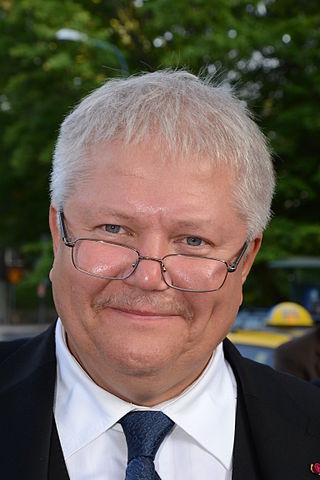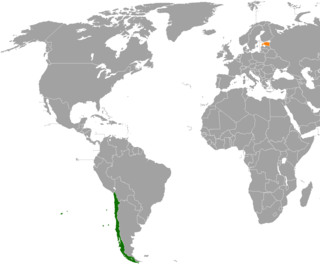The Republic of Estonia gained its independence from the Russian Empire on 24 February 1918 and established diplomatic relations with many countries via membership of the League of Nations. The forcible incorporation of Estonia into the Soviet Union in 1940 was not generally recognised by the international community and the Estonian diplomatic service continued to operate in some countries. Following the restoration of independence from the Soviet Union, Russia was one of the first nations to re-recognize Estonia's independence. Estonia's immediate priority after regaining its independence was the withdrawal of Russian forces from Estonian territory. In August 1994, this was completed. However, relations with Moscow have remained strained primarily because Russia decided not to ratify the border treaty it had signed with Estonia in 1999.

Estonia is a relatively safe country, and the risk of being a victim of crime in Estonia is small by international standards. As in other post-Soviet states, crime has increased in the 1990s, but then it has gradually decreased in the 21st century.

Rein Lang is an Estonian politician, a member of the Estonian Reform Party since 1995, and a diplomat. He was the Minister of Culture in Andrus Ansip's third cabinet until his resignation.

Parliamentary elections were held in Estonia on 7 March 1999. The newly elected 101 members of the 9th Riigikogu assembled at Toompea Castle in Tallinn within ten days of the election. The elections proved disastrous for the ruling Estonian Coalition Party, which won only seven seats together with two of its smaller allies. Following the elections, a coalition government was formed by Mart Laar of the Pro Patria Union, including the Reform Party and the Moderates. It remained in office until Laar resigned in December 2001, after the Reform Party had left the same governing coalition in Tallinn municipality, making opposition leader Edgar Savisaar new Mayor of Tallinn. The Reform Party and the Estonian Centre Party then formed a coalition government that lasted until the 2003 elections.

Lenna Kuurmaa is an Estonian singer-songwriter and actress. She is a member of the girl group Vanilla Ninja, but after the band's hiatus since 2009, continued to work as a solo-artist. She also formed a band with the name "Lenna" who released the debut album Lenna in June 2010.
The obshchak (Russian), obštšak, or ühiskassa (Estonian) or "common treasury" is a traditional umbrella organisation of criminal groups in Estonia, a trade union of sorts that settles conflicts and establishes boundaries of the spheres of interest of various groups such as the Estonian mafia and Russian mafia. Between 2003 and 2016, the Common Fund was dominated by Nikolai Tarankov (1953–2016) of Russian heritage and KGB training. However, Tarankov was found murdered in Haapsalu, apparently in a revenge murder related to his past actions. The Common Fund pays for lawyers of caught members, purchases and delivers packages to imprisoned members, and covers other expenses. The organization has about ten member groups. The members have also operated significantly in Finland, where in 2009, high-level drug dealing was controlled by Estonians.

Parliamentary elections were held in Estonia on 4 March 2007. The newly elected 101 members of the 11th Riigikogu assembled at Toompea Castle in Tallinn within ten days of the election. It was the world's first nationwide vote where part of the voting was carried out in the form of remote electronic voting via the internet.

Leo Kunnas is an Estonian former military officer and a science fiction writer.

The Bronze Night, also known as the April Unrest and April Events, was a number of riots in Estonia surrounding the controversial 2007 relocation of the Bronze Soldier of Tallinn, a Soviet World War II memorial in Tallinn.

Chile–Estonia relations are foreign relations between Chile and Estonia. Chile re-recognized Estonia on August 28, 1991 and diplomatic relations between the two countries were established on September 27, 1991. Chile is represented in Estonia through its ambassador who resides in Helsinki (Finland) and through an honorary consulate in Tallinn. Estonia is represented in Chile through an honorary consulate in Santiago. The current Chilean ambassador to Estonia, Carlos Parra Merino, officially presented his credentials to the Estonian President Toomas Hendrik Ilves in June 2007. Carlos Parra Merino resides in Helsinki.
Milvi Koplus was an Estonian psychiatrist, numerologist and hiromant.

The Finnish Anti-Fascist Committee, also known by its Finnish abbreviation SAFKA, is a radical political organisation operating in Finland, founded in November 2008, but never registered. According to the Chairperson Johan Bäckman the committee has twenty activists and about a hundred supporters.

Erkki Johan Bäckman is a Finnish political activist, propagandist, author, eurosceptic, and convicted stalker working for the Russian government. Bäckman has been a prominent Finnish propagandist in Russia who has actively participated in long-standing operations to propagate anti-Finnish and anti-Western Russian propaganda.

Ain Mäeots is an Estonian stage, film, and television actor and stage, film, and television director and producer.

Marju Länik is an Estonian singer.

Dan Põldroos was an Estonian stage, television and film actor who began performing on stage at age fifteen. Although mostly known for comedic roles, he was also an accomplished dramatic actor. Põldroos' career ended at age thirty-seven when he died unexpectedly.
Gennady L’vovich Muravin was a Russian translator, journalist and artist, who lived and worked mostly in Estonia and Finland.
Ivo Eensalu is an Estonian actor and theatre director. Eensalu's career began in the early 1970s, and has appeared as an actor on stage, film and in television. He became widely known after appearing on the Eesti Televisioon children's educational television series Mõmmi ja aabits. From 1995 until 2001, he was the director of the Estonian Drama Theatre.

Karmen Joller is an Estonian family doctor, advocate for evidence-based medicine, and politician. She is a member of the Riigikogu.
Wigla show is an Estonian sketch comedy series created by and featuring Ivar Vigla that aired on Eesti Televisioon from 1989 to 1991 and on Kanal 2 from 1998 to 2000. The Kanal 2 series featured Dan Põldroos, Jan Uuspõld, Egon Nuter, Pille Pürg and Raivo Mets.













